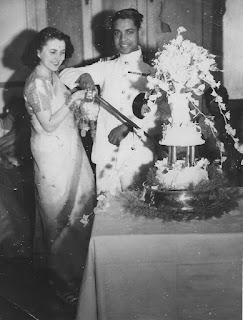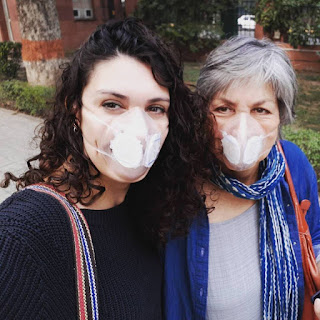 |
| Lt. Bhagwati Prasad (Bob) Sinha |
 |
| Photo by Nitin Dani - http://www.nitindani.com/ - Used with permission |
Kayashthas worship pen and ink and perform an annual pooja (worship ceremony) to them. My grandfather joined the postal service and rose to become Postmaster of Nanpara, and was given the honorific title “Bahadur”, often given to officers in British service. He became a prominent man in his village.
Dad’s mother was Nepalese and died of puerperal fever, along with his baby sister, shortly after giving birth. Dad was still a baby himself. When I interviewed him about his life in his ‘80s I asked him what her name was. He said he didn’t know. Apparently he never thought to ask. His father remarried a couple of years later.
Dad’s mother was Nepalese and died of puerperal fever, along with his baby sister, shortly after giving birth. Dad was still a baby himself. When I interviewed him about his life in his ‘80s I asked him what her name was. He said he didn’t know. Apparently he never thought to ask. His father remarried a couple of years later.
Dad was an only child, but he had a cousin-sister Priya, two years older than him, of whom he was very fond. One night, when he was seven and she was nine, they were sleeping outside under the chajja – an overhanging cement canopy – when it collapsed killing her outright. Dad was saved by two beams that crossed over his bed. He still became emotional talking about it more than seventy years later and this was unusual because he was a man who rarely showed his feelings. He had suffered a lot of loss in his young life and was always a loner, spending more time with his maths master than with friends, though he once showed me a scar in his head which had been caused by a friend who had accidentally struck him with an axe while they were foraging for firewood in the forest. Dad was bending over holding a log for his friend to chop. The friend was frightened and ran home without telling anyone and it was hours before Dad was found. There was no hospital in the village and he said they had plastered his head with a poultice of “some local remedy, like hay and cow dung”. I’m still not sure if he was joking.
After school Dad went to the University of Lucknow, where he
joined the University Training Corps. The Scottish NCO who ran it took a shine
to him and encouraged him to sit the exams to join the armed forces. Indians had started been accepted as officers in the Royal Indian Navy in 1934, and they took just one a year, and only as engineer officers, probably because it meant they would never command a ship. Dad took second place in the national exam
and had a choice of all three services. He took the navy place because he liked the
uniform and he wanted to travel, and naval officers were trained in Britain,
while army officers went to Dehradun.
 |
| Mum and Dad's wedding |
Dad arrived in Britain in 1938, and trained at Portsmouth
Dockyard and Royal Naval Engineering College, at Keyham, Plymouth. He remained in
Britain throughout the war, and after getting five firsts at Keyham was the
first Indian to attend Greenwich Naval College. He also served on the Arctic Convoys, which carried food and supplies to Russia, then our allies. He was in
one of the ships, The HMS Jamaica, which was involved in the Battle of the North Cape, when the pride of the German navy, the battleship Scharnhorst, was sunk.
 |
| The Ushakov Medal |
There’s a story about the way the land was acquired. My
great-grandfather was Chief of Police to the Rajah of Nanpara, and it was
rumoured that the land was given to him as reward for helping to conceal from
his British superiors that the Rajah had walled up alive his favourite dancing
girl for running off with one of his stewards. My father said the rumour was
rife when he was a child and he once asked his grandfather if it were true, but
his grandfather denied it. But then, as Mandy Rice Davies put it, “Well, he
would, wouldn’t he?”
 |
| Shishir, India and I in front of the Rajah of Nanpara's palace - now derelict |
When I visited my grandparents’ house as a child, there was
no electricity or running water and the toilets were open air cement channels
in which three people could squat companionably side by side. A bucket of ash
stood nearby to be sprinkled over the ‘kaka’, which was scooped out with
shovels through holes in the courtyard wall by the Dalits, or “Untouchables”,
as they were known then. Showers were taken by the well, under the mango tree,
and I enjoyed pulling up the buckets and washing our clothes there too, much to
my grandmother’s astonishment.
 |
| My grandparents in old age |
 |
| Dad and Grandad in later life |
As we walked through the forest, I said to my father, “What
if a tiger comes along?” He laughed. “Don’t be stupid. It’s rare to see a tiger
and, anyway, it would be more afraid of us than we are of it.” When we arrived at
the Reserve, it was apparent from the general gadbad (disarray) that something had happened. A guard came rushing out to meet us and demanded: “What are you doing walking
through the forest? Don’t you know there’s a man-eater out there?”
It turned out that the night before one of the guards had gone to do his business in the forest (apparently there were no toilets in their quarters) and while crouching had been mistaken for an animal by the tiger, which carried him off. The guards had been looking for him all morning and had eventually found his lota (washing pot) on the other side of the ditch that separated the quarters from the forest. That morning the postman, cycling to the Reserve, had been charged by a tiger and knocked off his bicycle. Fortunately the tiger attacked the bicycle and the postman was able to climb a tree. The guards seemed angrier with their unfortunate colleague than with the tiger. “God knows why he crossed the ditch,” the guard said. “Stupid bastard! Now we’ll have to kill that tiger, because once they’ve tasted human blood they get a taste for it.”
It turned out that the night before one of the guards had gone to do his business in the forest (apparently there were no toilets in their quarters) and while crouching had been mistaken for an animal by the tiger, which carried him off. The guards had been looking for him all morning and had eventually found his lota (washing pot) on the other side of the ditch that separated the quarters from the forest. That morning the postman, cycling to the Reserve, had been charged by a tiger and knocked off his bicycle. Fortunately the tiger attacked the bicycle and the postman was able to climb a tree. The guards seemed angrier with their unfortunate colleague than with the tiger. “God knows why he crossed the ditch,” the guard said. “Stupid bastard! Now we’ll have to kill that tiger, because once they’ve tasted human blood they get a taste for it.”
The next morning we went out on elephant back, sticking to
the path, and were lucky enough to see, not one, but two tigers. One was walking
through the long grass, almost perfectly camouflaged. The other was lying by
the side of the track. He allowed us to approach within ten feet of him
before lazily getting to his feet and ambling away. Clearly not so afraid of
humans then.
To be continued…











